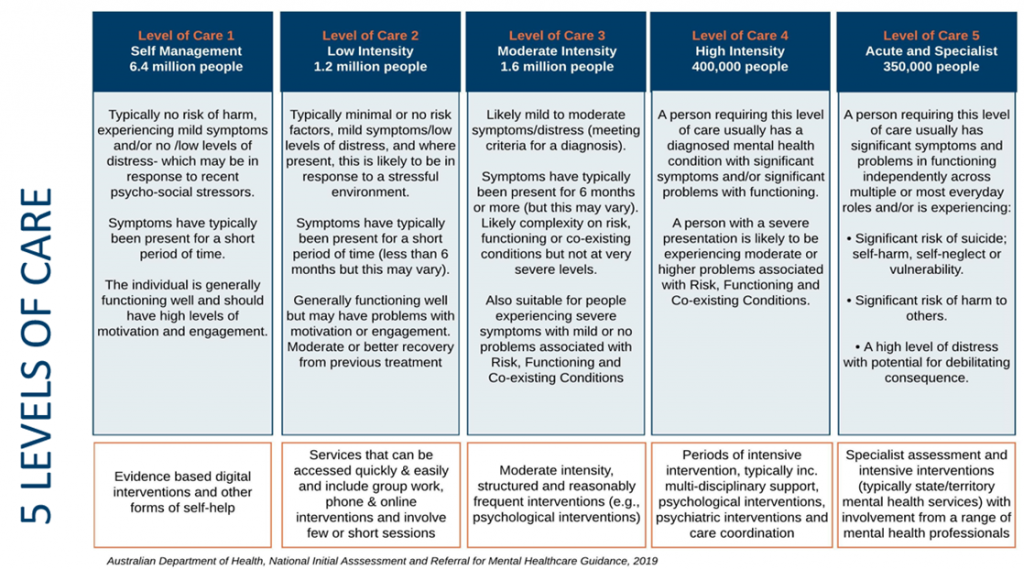
The Vital Role of GPs in Addressing Mental Health
Over two in five Australians aged 16-85 years will experience a mental illness during their lifetime[1]
Last year, 16,895 people in Western Sydney were diagnosed with a mental health condition, with anxiety and depression amongst the top five diagnosed conditions in primary care. Over the past few years, huge strides have been made in removing the stigma around mental health and breaking down barriers to accessing mental health care. In the WentWest 2021 Needs Survey: General Practitioners and Allied Health Professionals (AHPs), 70% of GPs listed ‘psychological’ as a common reason for patient visits in 2021[2]. This demonstrates the important role that GPs play, and will increasingly play, in their patient’s mental health care.
Five Levels of Stepped Care
Stepped care has been a part of mental health service delivery since 2015; however, the three-step model has recently been updated to cover five levels of care. The role of stepped care in mental health service delivery is central to the Australian Government’s mental health reform agenda and joint regional mental health and suicide prevention planning. In the new model, Level 1 is the lowest risk and covers mental health self-management, with Level 5 including acute and specialist mental health care.

What You Told Us and How We’re Responding
In the 2021 WentWest Needs Survey, over 50% of GPs and AHPs in Western Sydney stated that they were unaware of key mental health services and that 41% to 63% of patients are not able to access services easily[3]. That’s why this year, we have been implementing communications activities to improve community and health professionals’ awareness of mental health services, including via social media campaigns, videos and feature articles.
The following videos highlight just a small selection of the health services available in our region:
- Head to Health
- Safe Space
- NSW Service for the Treatment and Rehabilitation of Torture and Trauma Survivors (STARTTS)
Find out more about our mental health communications being rolled out.
Mental Health Service Access for Everyone
Over 3,000 people die by suicide in Australia each year, which is an average of nine lives lost per day.[4]
Western Sydney has one of the most diverse populations in Australia, with 52.6% of residents born outside of Australia[5]. To help our community access the best care, the Western Sydney Primary Health Network (WSPHN) commissions culturally-appropriate, timely and affordable services that respond to the mental health needs of people from all backgrounds.
This year, the 2021/22 Your Experience Survey (YES) showed that 93.45% of clients were satisfied or very satisfied with the mental health service they accessed.
WSPHN currently commissions 25 mental health support programs and services and continues to explore additional ways we can open doors to easily accessible, comprehensive support.
October is Mental Health Month and encourages all of us to think about our mental health and wellbeing, both of our patients and as health professionals.
For further information about services available in Western Sydney, including how to refer patients, please visit our website.
[1] Australian Bureau of Statistics (2021), National Study of Mental Health and Wellbeing, available from: https://www.abs.gov.au/statistics/health/mental-health/national-study-mental-health-and-wellbeing/2020-21
[2] WentWest (2021), Mental Health – We’re Listening, available from: https://wentwest.com.au/wp-content/uploads/mental_health/NeedsSurvey2021_MentalHealth.pdf
[3] WentWest (2021), Mental Health – We’re Listening, available from: https://wentwest.com.au/wp-content/uploads/mental_health/NeedsSurvey2021_MentalHealth.pdf
[4] Australian Bureau of Statistics (2021), Causes of Death, Australia. Based on 2020 data.
[5] Australian Bureau of Statistics (2021), 2021 Census, available from: https://www.abs.gov.au/census/find-census-data/search-by-area